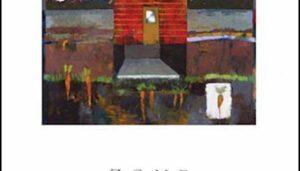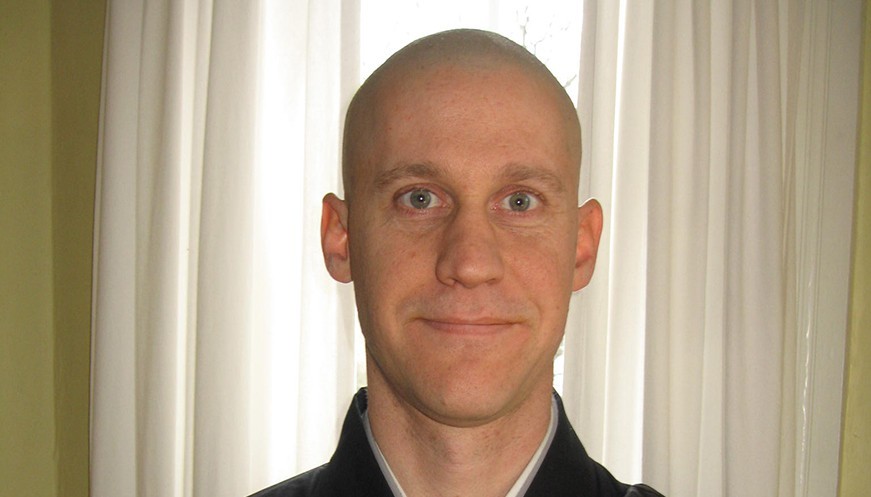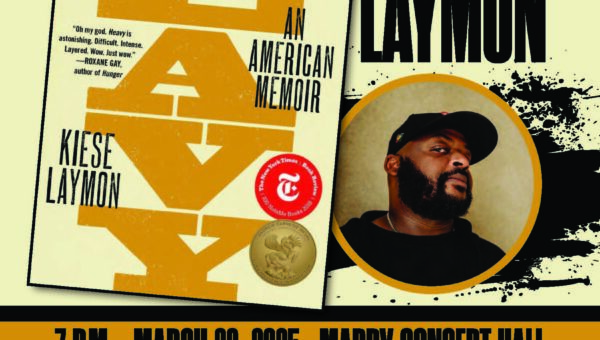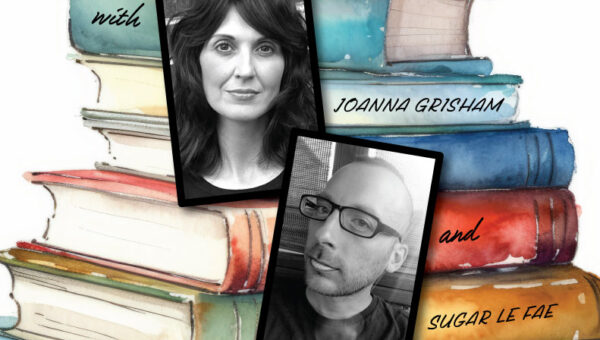Amy Wright: When your writing succeeds what does it manage to do?
David Rutschman: The writing I most admire shifts something in me as a reader, and I’d like to imagine being able to do something similar in the work I create. The shift can take various forms. Here are some:
From familiar to strange
From tragic to ridiculous
From distant to near
From near to impossibly near
The other way around works too: from strange to familiar, ridiculous to tragic, etc.
The shift is surprising, embodied. When I look back up from a page of writing that does this for me, the room has changed. It’s alive in a different way.
Now, I don’t know how often I’m able to make this happen for a reader. Probably pretty rarely. It’s a high, high bar. And I’m open to readers having other kinds of experiences. But for me, at least, that’s the goal I’m chasing. The big fish.
The goal that’s beyond that goal, of course, is to create some sort of shift, and then use that as a baseline for another shift, and another one after that. That fish is even bigger, and even more rare.
Wright: What do you feel are your responsibilities as a writer to social issues?
Rutschman: I feel those responsibilities keenly, but I feel them more through the other defining roles of my life: as a citizen, a parent, a therapist, a [Zen] priest. My relationship to social issues as a writer is harder to pin down.
I do know that the fiction that I’m most moved by is based on a kind of reaching out with empathy, though, a kind of profound wanting to know what life is like for other beings, and that impulse is in harmony with a politics based on respect and kindness and decency.
So maybe it isn’t exactly that because I’m a writer I need to have any particular political or social opinions, but more that there’s a basic orientation of interest in others that underlies both my political views and my writing. That feels right to me.
Wright: The story by which I first found your work, “The Hogs, The Sow, The Wind” has a parable-like quality. What storytelling traditions inform your work?
Rutschman: In graduate school I mainly read and wrote realistic fiction, which was wonderful and exciting and rich. Over the next few years, though, I gradually began to give myself permission to write in modes other than realism. I’d always loved the wild, inventive work of Julio Cortázar, Clarice Lispector, Gabriel García Márquez, Doris Lessing, Ursula Le Guin, Jeanette Winterson, Angela Carter. And religious writers: Eihei Dogen, the Zen koan tradition, the Sufis, the Gospels and Psalms, the Desert Fathers. Ancient texts: Aesop, Homer. Children’s literature: the rabbits in Watership Down.
Little by little, I began to allow myself to write stranger stuff, pieces that didn’t necessarily center ordinary ways of knowing. I remember an early (terrible) story from the point of view of a louse. I felt freer, less constrained. I started to let myself write from and into a wider range of traditions—parable for sure, and fable, poem, joke, cartoon, dream. Those were also the years I was coming to a serious meditation practice, and the ways that zazen can sometimes soften and shift and clarify the mind folded into this change too, probably in ways I don’t completely understand.
I still write realistic fiction, but now it’s as one choice in a range of possible modes, rather than as an unexamined, limiting default setting.
Wright: You employ animal characters in several stories. Will you describe what archetypal figures such as snakes, foxes, roosters, and hens bring to the page?
Rutschman: A kind of strangeness and delight. A vivid immediacy. The brilliant writer/teacher Kevin McIlvoy talks about “the child reader alive in the adult reader.” I think the child reader perks right up when the animals start talking.
Wright: Do you think imagining perspectives alien to one’s own has practical contemporary value?
Rutschman: Yes, my God. If we can’t somehow work with other perspectives, then there’s just no hope for any of us.
I think it’s possible to go even farther than imagining other perspectives, actually, although that’s a crucial first step. I think fiction can take us to a place where we recognize those “alien” perspectives as part of ourselves. In other words, it’s not just that fiction brings me closer to others, although it can, of course. It’s more like fiction can sometimes blur or change or mess with that underlying self/other distinction itself.
Wright: How would you describe your forthcoming debut short story collection, Into Terrible Light?
Rutschman: My friend, the astonishing poet Matt Hart, approached me a few years ago about bringing out a collection through his press, Forklift Books. In the time it took to shape the book, which included going back through and revising/rethinking lots of old stories, and writing lots of new ones, I fretted quite a bit about how the thing would cohere. As you’ve noted, there are a range of storytelling traditions here—realistic and fabulist modes, longer and shorter pieces, a hodge-podge of voices and concerns—and for a while, I really worried about whether a reader would track through the changes with me. Would it be too much to ask someone to go from a tiny fabulist piece like “Fatherhood” or “The Donkey at the Gates of the Kingdom of Heaven” to a realistic story like “Boom-Boom Whoop” or “Voices of Smoke?” What would it be like to move from a world where chickens discuss the nature of the self to a world where a woman finds dog shit on the floor of her former boss’s fancy house, or from a passage about a young man disappeared from the streets of Buenos Aires to a story about dancing bears? Wouldn’t it maybe be better to conceive of this as two books: one for the realistic stories, one for the others?
But every time I started to go down that road, I’d remember the Avatamsaka Sutra. Do you know the Avatamsaka Sutra? It’s an important Mahayana Buddhist scripture, a dizzying and visionary and beautiful text, full of long ornate descriptions of various interpenetrating worlds. At a couple of places in the sutra, sort of buried among these intricate descriptions of fantastical Buddha-realms, there are these brief, almost perfunctory descriptions of our world. They’re some of my favorite passages in all of religious literature. Our world, our actual world, is there, is included in the cosmic vision, but only as one part of a staggeringly complex whole.
I’m on a tangent here, but I’m coming back, I promise. I realized how important it felt to me that Into Terrible Light be one book, not two. That the realistic stories, the ones in settings that we recognize as our everyday, conventional life, share space with these other pieces that work more as fables, parables, dreams.
As the book continued to take shape, then, I was delighted to feel that it really was coming together, that the pieces were in relationship with each other across their differences, that they harmonized in subtle and surprising ways. I definitely culled out many stories that I thought didn’t fit, that didn’t have that sense of contributing in some way to the whole.
To get back to your question, then, I’d say that Into Terrible Light is a collection of 39 stories in different modes and different voices, but all—I hope—cohering into something larger. It’s also just 39 stories that I like a lot, and that I like a lot together.
Wright: You said the Avatamsaka, or Flower Garland, Sutra has some of your favorite descriptions of our world. Will you cite or paraphrase a favorite?
Rutschman: I could pretty happily talk about the Avatamsaka Sutra all day long. It’s a text that’s just . . . I believe the religious studies term is “bonkers.” I mean that in the most reverent sense. It’s also a text that’s really, really hard to quote from or paraphrase because it’s nearly impossible to capture the scale and intricacy of it. In Thomas Cleary’s English translation it runs over 1500 pages. It just goes on and on and on.
I’ll give it a try, though. The sutra offers a vision of reality as containing an infinite number of interpenetrating realms, and there are various places in the text that are simply long, long lists of worlds. What’s moving for me about the passage I was thinking of isn’t so much the description of our world (which uses a standard set of symbols which would take a while to unpack) but more how that description is folded in to the rest.
The list of worlds begins like this:
Above this, past worlds as numerous as atoms in a buddha-field, is a world called Beautiful Array of Lotus Flowers of Various Scents, bounded by all kinds of ornaments, resting on a network of jewel lotus blossoms, shaped like a lion throne, covered with nets of pearls of the colors of all jewels, surrounded by as many worlds as atoms in two buddha-fields. The Buddha is called Supreme Radiance of Lion Light.
The list continues in precisely this format: a few sentence description of each world, using these standard images of flowers and jewels and nets and so on, then the name of the Buddha for that world, then the next paragraph.
A few pages later, we get:
Above this, past worlds as many as atoms in a buddha-field, we come to this world, called Endurance, bounded by ornaments of diamonds, held by atmospheres of various colors, resting on a network of lotus flowers, shaped like space, covered by space adorned with spherical celestial palaces, surrounded by worlds as numerous as atoms in thirteen buddha- fields. The Buddha is this Vairocana.
Amy, that’s us! That’s our world! Shaped like space! “Endurance” is how Cleary renders the Sanskrit word “saha.”
Then—this is the best part, the part that gives me goosebumps every time—the list goes on, just like that, world after world, for thirty more pages. We’re just one small entry among hundreds. One tiny shard of glass in the kaleidoscope.
Wright: Oh, that is beautiful! Thank you.
Your main characters often behave in unseemly ways. To name just one example, in “Voices of Smoke” the protagonist nearly urinates on a dog that has been beaten to death. Will you talk about the function of bad behavior or anti-heroism in your writing?
Rutschman: I’m interested in awakening, which means I’m interested in delusion. Or, I’m interested in intimacy, which means I’m interested in distance. I’m interested in kindness, which means I’m interested in its absence.
I don’t think I write bad behavior for its own sake, or to titillate or shock. I’m genuinely, deeply committed to exploring our capacities—all of us—for blindness and cruelty, and for presence and warmth, and I don’t think we can actually study one side without studying the other.
I’m tempted to quote Dogen here: “Those who have great realization of delusion are buddhas; those who are greatly deluded about realization are sentient beings.” So to talk about buddhas—about those clear and important moments when sentient beings become buddhas—we need to talk about deep, deep, real delusion.
Can I keep going with the Dogen passage? “Further, there are those who continue realizing beyond realization, who are in delusion throughout delusion.” And finally: “When buddhas are truly buddhas they do not necessarily notice that they are buddhas. However, they are actualized buddhas, who go on actualizing buddhas.”
I try to write about buddhas actualizing buddhas without necessarily knowing that they’re buddhas, and I try to write about sentient beings in delusion throughout delusion.
Wright: I like your phrase “real delusion.” Might you give an example from your own life to illustrate that phenomenon, or becoming aware of it?
Rutschman: I misunderstand the role of my actions a lot. That’s one important realm of delusion in my life.
What I mean by that is that it’s very easy for me to think (on the one hand) that what I do matters more than it actually does or (on the other) that what I do matters less than it actually does. Or even that some particular set of my actions—this interview, say—matters more than another particular set of my actions—taking out the garbage or something—and that it’s possible for me to know which is which.
In my wiser moments, I see that that’s delusional. That whatever ranking system I have for what matters more and what matters less is necessarily limited and partial and wrong. That actually everything I do, like everything you do, acts on the entire universe in ways we’ll never be able to fully measure or understand.
I’m interested in trying to live from that kind of wisdom, that kind of full responsibility and attention, although I fail utterly, of course.
Wright: That’s an inspiring effort. The measure of man may well be the degree to which he takes responsibility for him or herself.
I understand or recognize myself in your characters, even in traits I’d prefer not to see—like when the rooster in “The Rooster in the Thorns” hides from a fox to save himself, without warning the hens. Are your characters a means of contemplation or reflection or even confession for you?
Rutschman: Definitely. I’m not particularly drawn to confession in an autobiographical or personal sense—“here’s this thing I did.” But maybe more as a description of existential possibilities—“here are the many kinds of creature I know myself to be.”
Wright: You spent time as a child living in Uruguay and Argentina under dictatorships. Will you describe those circumstances and effects they had on you?
Rutschman: Those years are a big deal for me, I think.
I was born in Uruguay in 1974, and we moved to Argentina when I was a baby. We left Latin America for the U.S. when I was five, so I can’t consciously access that time in my life very clearly, but it’s there—in the body, the marrow, in the family stories of dear friends jailed and tortured. I think the concerns in my stories—terror and wonder, patterns of loyalty and betrayal, dreams and nightmares, sudden life-changing shifts—all make a lot of sense against a backdrop of life under violent military rule.
It might be relevant, too, that I didn’t speak a word of English until we moved, and that after living in the States for a few years, my Spanish was pretty rusty. I went from one language to another as a kid, and since language is part of how we create and interpret our world, that means I had an early, important experience of shifting from one world into another.
I can sure see how that might connect to my work.
Wright: How do your aspirations and interests differ for fiction and nonfiction?
Rutschman: I mainly think of myself as a fiction writer, but I’m interested in political and religious and various other intellectual topics, and sometimes I find a thought that’s asking to be an essay or blog post instead of a story.
I should say that some of my favorite sentence-makers ever are nonfiction writers: Annie Dillard, for one, or James Baldwin. Or William Maxwell in his short essay “Nearing 90.” As a therapist and hospice counselor, I’m lucky enough to talk often with people in their 80’s and 90’s, and I think a lot about Maxwell’s last line in that essay: “Every now and then, in my waking moments, and especially when I am in the country, I stand and look hard at everything.”
Isn’t that a gorgeous sentence? Humble and clear, a little awkward. A moment like that could happen in a short story or novel, of course, but the fact that this is nonfiction—that Maxwell himself is speaking—makes it perfect.
Wright: Yes, it is, and it is hard to find similarly contained moments in fiction. A sentence of yours that seems to express your aesthetic, though, comes when the hog is asking himself whether he feels grateful to have survived or not: “It was hard to say, so hard to sum it all up, to keep it from turning into something else.” Is there a pause before each “turning into something else” that writing helps you recognize?
Rutschman: I appreciate you highlighting that sentence. There is a kind of rush in our experience, I think—how I’m always turning into something else, how the world is always turning into something else—and also the possibility of a kind of pause.
And it’s the relationship between the two that’s most moving to me. The way the pause blooms in the rush, the way the rush swells up in the pause.
My entire life feels like it takes place right there in that interplay, actually, that back and forth. Maybe yours does too. Maybe that’s where we can all find each other.





